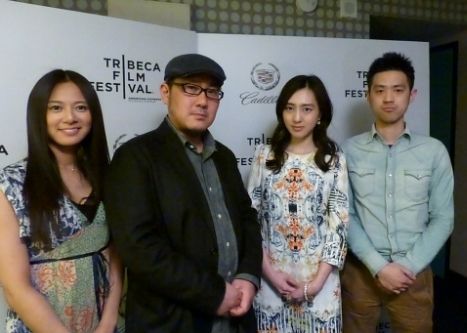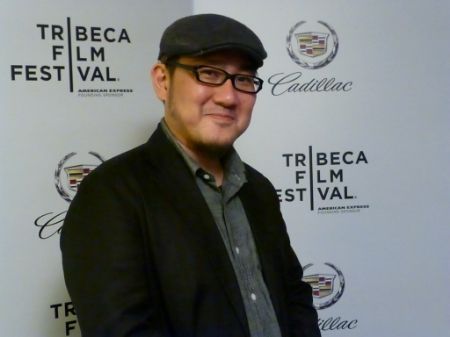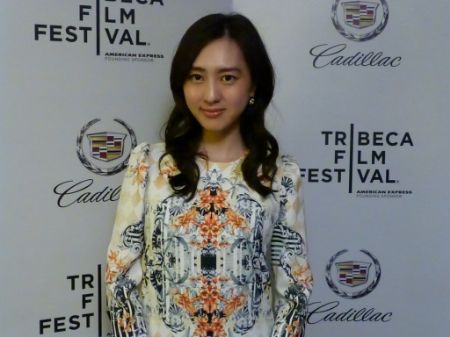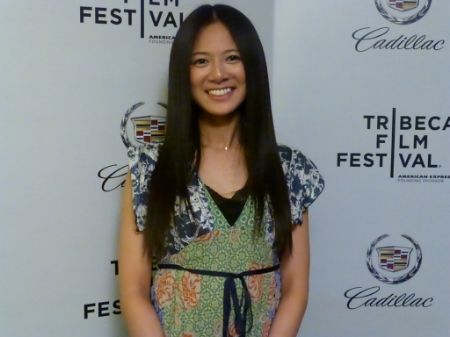 |
| Left to right: Yukiko Shinohara, Nobuteru Uchida, Kiki Sugino, Keita Jo |
What follows is a transcript of the conversation I had with director Nobuteru Uchida (best known for his previous film Love Addiction), lead actresses Kiki Sugino (also the film’s producer) and Yuki Shinohara on how the film came to be. Hisami Kuroiwa and ODAYAKA’s sound editor Keita Jo made communication possible with their translations. It was a joyful linguistic chaos that ensued as participants switched between Japanese and English, sometimes answering questions and other times offering alternate translations of their colleagues’ responses.
MC: So first of all, welcome to New York. What is your impression so far?
Nobuteru Uchida: Before I came to NY, I thought NY is very “stylish,” but I realized there are so many different races and people work really hard - it’s a place for ordinary people, too. It made a positive impression on me.
MC: What was the reaction to the film when it was first released in Japan?

NU: There were so many different kinds of opinions. At first I thought many people would have a lot of different opinions but once the movie started showing, I found that many people sympathized with it. That made me happy.
MC: Did you encounter resistance to making the film?
NU: I thought I should make this movie. Then I asked Ms. Sugino to gather money so she must have had some difficult experience to fund the movie.
Kiki Sugino: Most investors had a negative attitude because they want to make more entertainment and comedy films, especially after March 11th. So, it was very difficult to finance.
MC: When were you first struck with the inspiration to make the film?
NU: I experienced the big earthquake in Tokyo. Then, a few days later I was bicycling around my neighborhood and I realized there was a big gap between what’s going on inside people’s homes and outside. So people got really nervous when they are at home but outside, they seem very calm. Once I realized this situation, I thought it’s a good topic and I should make a movie about this situation.
MC: Can you speak about the sentence ‘nani o mite inai’ (they don’t see anything), which is said in the movie. Did you think of this expression or is it often said in Japan about this situation?
NU: I think that sentence might’ve been used somewhere. Before this tragedy happened, I knew I pretended to not notice problems. Then, I think people tried not to see the problems; they tried to avoid them. People just focused on trivial things, like ‘tonight’s dinner was good.’ After the earthquake I could see this situation clearly.
MC: Were the two main characters’ situations made up or based on fact?
NU: I made this movie as a fiction story but it’s based on interviews and my feelings and experiences. While I was interviewing people for the movie, I came across a lot of facts. So, this movie is a combination of those facts and my feelings and experiences.
MC: Women’s struggles seem to be a prominent aspect of the film...
NU: I think women struggled much more than men after the earthquake, especially those who are mothers. So the main character represented mothers in that situation.
MC: To the actresses, did this affect your interest in the movie?

KS: After the earthquake of March 11, I think many women don’t say anything because in Japanese society, men have more power. Why I wanted to be in this movie was not only because it tells a woman’s story. I think after the earthquake people who speak the truth are discriminated against by the rest of society so I wanted to help make a more peaceful society. I also wanted to elevate women’s position in society. These are the reasons why I made this movie.
Yuki Shinohara: If this story was about two men, then the story would be more complicated. But, because the main characters are women it makes the story simpler.
MC: The dialogue in the film feels incredibly genuine. Can you speak about how you brought this about?
NU: I used the same method as I did for my previous movie Love Addiction. I wrote a script but I told the actors to forget about the script because I’d like to make the movie feel real. I’m interested in how actors showed their characters’ feeling, especially in situations of conflict. In this movie actors improvised.
With improvisation, I got a lot of dialogue, which show characters’ real feelings. Those exchanges make me relate to the characters, and I think they are much more realistic than my script. So I’d like to keep making movies in this way.
MC: Do any particularly memorable moments of improvisation come to mind?
KS: The most powerful instance of this was when the two main characters met and my character broke into Yukako’s apartment and asked why she didn’t kill me. That was done in only one cut.

YS: One of the most unforgettable scenes is when the two main characters meet. And I think the last scene is also very memorable for me. There is an elementary school where I could hear the sound of many children playing. This situation truly captured this sense of ‘odayaka,’ (calmness). It made me feel as though I really was that character. The dialogue came from inside me. The words were the same as the script, even though I never memorized it. It was the most profound acting experience I’ve ever had.
MC: Can each of you speak about something you took away from the experience of working on ODAYAKA? Anything that may affect your future work in film...
NU: In the past I usually wrote only a plot and then used improvisation but for this movie, which was more commercial, I wrote a script. But while shooting, I used improvisation. That was a fresh experience for me and it worked out well. So, I’d like to keep using this way of making films.
KS: It was really difficult to make this movie so I think I gained confidence to play any role; even if I have very complicated movie related to politics or discrimination...By making this movie I realized what type of roles I really want to act. I’d like to be in the films which don’t contain any lies. I’d like to be in films which are honest and tell the truth. Life is short so I should play the character that I really want.
YS: The character I played is very different from myself. I had to look deep inside myself. I experienced really becoming this character because of the director’s way of making the film. This helped me to understand people. I feel I’ve grown as a person.
Special thanks to Shigeko Okano for reviewing and smoothing out the translations!
Mondocurry on twitter = @mondocurry
Special thanks to Shigeko Okano for reviewing and smoothing out the translations!
Mondocurry on twitter = @mondocurry
No comments:
Post a Comment